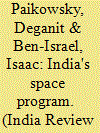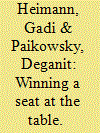|
|
|
Sort Order |
|
|
|
Items / Page
|
|
|
|
|
|
|
| Srl | Item |
| 1 |
ID:
110121


|
|
|
| 2 |
ID:
153374


|
|
|
|
|
| Summary/Abstract |
Israel’s space programme includes the capability to build, operate and launch satellites into space. In 1988, only seven years after the programme was established, Israel launched its first satellite, Ofeq-1.1 At that time, only seven countries had demonstrated an indigenous capability to develop and launch satellites. Given the high costs and risks involved in undertaking such an ambitious national project, it might appear surprising that a small country like Israel – even taking into consideration its acute security needs – would take on such a burden. The Israeli leadership’s strategic rationale for doing so is not obvious, inviting further consideration of the country’s national-security decision-making and goals.
|
|
|
|
|
|
|
|
|
|
|
|
|
|
|
|
| 3 |
ID:
181029


|
|
|
|
|
| Summary/Abstract |
This article seeks to explain states’ success, either full or partial, in obtaining a place in an exclusive managerial forum and the managerial privileges this entails. We argue that the ability to join an exclusive forum and gain these privileges depends on three factors: the extent to which the potential junior partners’ assets seem attractive to the forum’s leaders; the extent of potential junior partners’ solidarity with the leading powers; and the leading powers’ ability to obtain legitimacy for including new members from the other states subject to the authority of the forum. These arguments are demonstrated through an examination of two test cases: the United Kingdom’s partial success in achieving integration at the end of the 1940s by gaining informal privileges from the United States, and France’s failure to gain institutionalized integration a decade later and its refusal to be satisfied with informal privileges.
|
|
|
|
|
|
|
|
|
|
|
|
|
|
|
|
| 4 |
ID:
135159


|
|
|
|
|
| Summary/Abstract |
This report surveys the principal space events of 2013 and analyzes the central trends that can be discerned in government space activities in nations around the world. The article refers to cooperation between countries, to trends in space security, and reviews the space policies and activities of the leading nations as well as emerging ones. The proportion of government funds has declined in recent years; at the same time, space is one of the fields in which commercial endeavors are closely tied with government activities, and is strongly affected by the dynamics and politics between nations. The international community is struggling over the nature of activities in space, world leadership, and what should be permitted and what should be prohibited. Alongside this struggle for control and influence, many nations have come to understand that challenges and threats exist which require cooperation to address adequately. The concern is that, in the absence of appropriate action, use of space will be denied to all. The principal challenge facing the international community is to find a way to surmount obstacles to cooperation. Accordingly, follow-up and analysis of the interests, goals, and conflicts between the nations that are formulating the priorities and making the decisions about space are essential for understanding the direction in which developments in space are headed. They are also indispensable in creating a sustainable space industry.
|
|
|
|
|
|
|
|
|
|
|
|
|
|
|
|
| 5 |
ID:
188612


|
|
|
|
|
| Summary/Abstract |
Established powers enjoy privileges in world politics coveted by emerging powers. These privileges vary in their level of institutionalization: full formal privileges, partial formal privileges, and informal privileges. We identify two alternative strategic routes through which emerging powers target these three types of privileges: a top-down and a bottom-up route. We analyze two factors that impact the choice between these two routes: restrictiveness of eligibility criteria for winning privileges, and the expected levels of opposition by both established powers and outsiders. We examine the impact of these factors on two cases in which India negotiated privileges: India’s top-down campaign to win a permanent seat on the UN Security Council; and India’s bottom-up campaign to enter the nuclear club as a de facto nuclear weapon state. Highly restrictive eligibility criteria along with high levels of opposition drove India to gradually seek nuclear privileges through a bottom-up route.
|
|
|
|
|
|
|
|
|
|
|
|
|
|
|
|
|
|
|
|
|